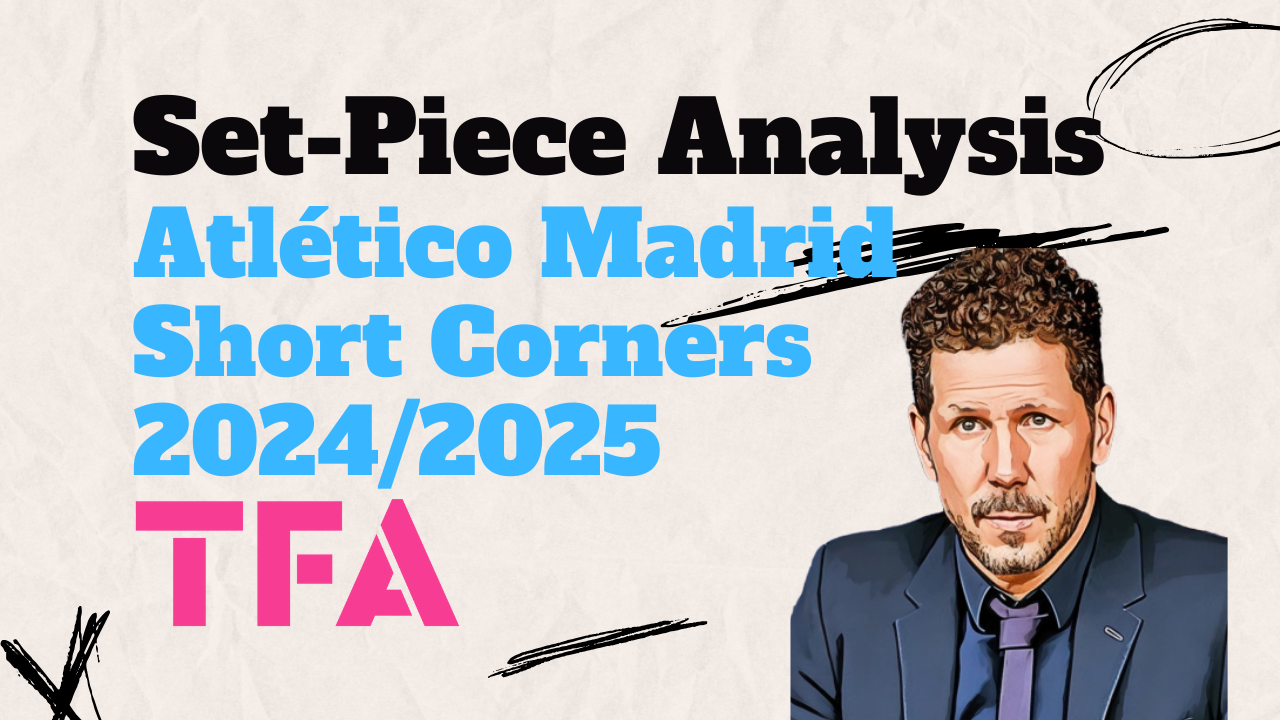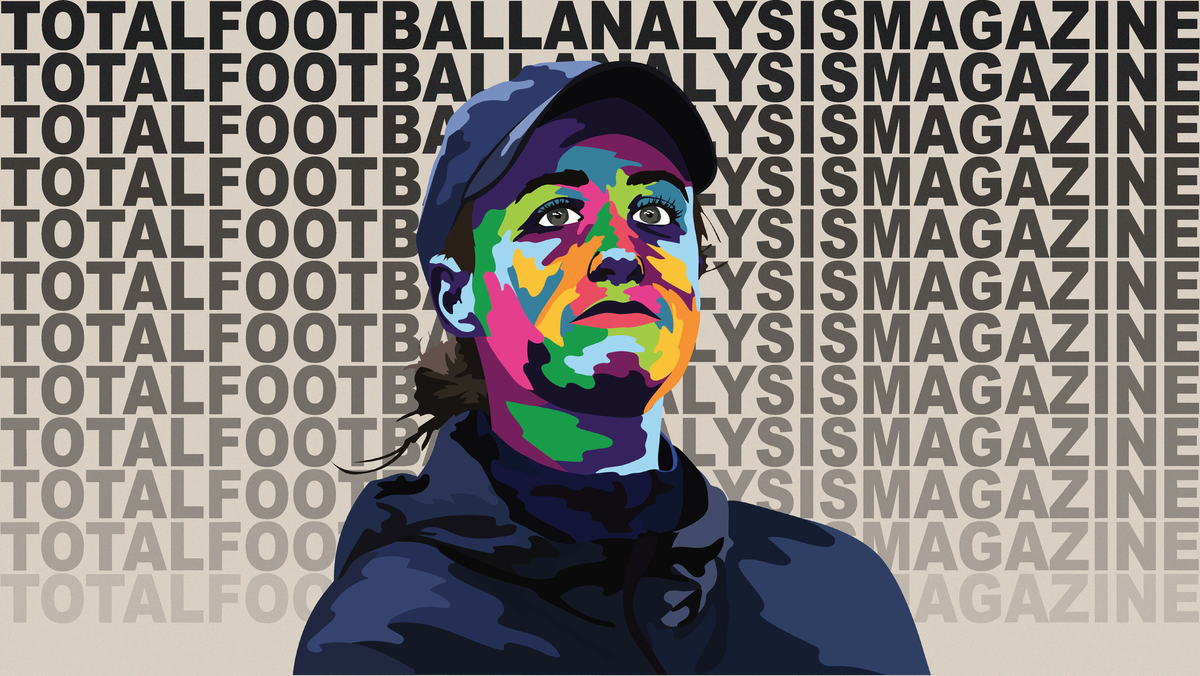The competition is intensifying in La Liga, with Atlético Madrid leading the table with 44 points after 19 matches, just one point ahead of Real Madrid, who have 43 points.
Barcelona and Athletic Club follow them, with 38 and 36 points, respectively, in third and fourth place.
When the competition is intense, fine margins can be crucial in determining the title winner.
One such margin is set pieces.
Everyone knows that Atlético Madrid are very strong defensively, so there is no surprise that they are the best defence in La Liga, conceding just 12 goals so far.
However, there is an important attacking aspect that has started to shine recently in their attacking set-pieces, especially corners.
In this tactical analysis, we will focus on how Diego Simeone's side proved excellent at short corners in their last three matches.
We will also show the tactics they used to exploit Antoine Griezmann and Julián Alvarez.
Short-Corner Superiorities
The first idea they have implemented is to create a sudden numerical superiority by starting with no short options.
Then, the edge-of-the-box player moves to receive a short pass and passes it back to the taker, again achieving a quick 2v1 situation.
— Footie Clips (@FootieClips) January 14, 2025
Let's clarify that in detail.
In the photo below, Osasuna defends with a man-marking system with just two zonal defenders (green) while noting that Atlético Madrid start with no short-option attackers.
Atlético Madrid start with six players inside the box, two edge-of-the-box attackers for the rebound and a player at the back (out of the shot) to be ready against any probable counterattacks.
One of the edge-of-the-box players (yellow) goes to receive a pass and passes it again to the taker.

In the photo below, the first zonal defender starts to run to help, but he has to go a long way, which frees the taker and gives him enough time to cross the ball (in-swinging) from a nearer point.
In the second part of the plan, focus on the six players in the box (numbered):
1- #1 and #2 (blue) will go to the far post (the targeted area).
2- #3 and #4 go back to the rebound, dragging their man markers with them, evacuating the box.
3- #5 moves behind the remaining zonal defender, taking his attention and keeping #6 free in the middle.

As shown below, #1 moves to the far post while #2 blocks his man marker to help him be free (screen).
After that, #2 will go with him.

As shown below, there is another advantage of targeting the far post, which is that the man markers are unable to keep tracking the ball and their assigned attackers in the opposite direction simultaneously.
This is called an "orientation problem" for the man markers, meaning they have to choose whether to track the ball or the attackers.

The plan works, and the ball reaches one of them, who decides to nod it back to the free player (#6), as shown below.

In the case below, the short-option defender goes with the attacker as close as he can, but he suffers from the late help, falling into the same 2v1 situation.
He decides to close the pass to the taker this time, which gives the short-option attacker the time to cross the ball easily.
— Footie Clips (@FootieClips) January 14, 2025
Let's explain that in detail.
As shown below, Atlético Madrid just use five players in the box in this case to add a short-option attacker.
The short-option defender goes as close as possible to the short-corner attacker, but the zonal defender is still too far to help.

As shown below, the short-option defender (pink) is confused in this 2v1 and waits for help.
This gives the short-option attacker the time and space to cross the ball himself toward the area behind the remaining zonal defender, but the cross isn't optimal.

You may ask what they do if they face a team that has two quick, short-option defenders ready to press, preventing them from achieving this numerical superiority.
— Footie Clips (@FootieClips) January 14, 2025
In the photo below, they face Barcelona who defend with two zonal defenders (green), five man markers near the penalty spot, two short-option defenders coming from different starting positions and a player on the edge of the box to defend the rebound zone (pink).

In the photo below, they perform the same wall pass, but the taker (Griezmann) may not have the same time to cross the ball as in the previous case.
The idea is to free Alvarez (blue) to receive a grounded pass between the two short-option defenders.
His teammate (yellow), who blocks his man marker, helps.

In the photo below, the screen is clear (yellow), and the remaining attackers move in front of the second zonal defender, preventing him from advancing to cut the pass.
The plan works, but the pass isn't accurate, and the angle is also partly tight.

The second idea they have against this enough number of defenders in the short and rebound areas is to rotate the ball to the second edge-of-the-box player to shoot directly.
— Footie Clips (@FootieClips) January 14, 2025
As shown below, the zonal defender who helps (green) is in a nearer place, which allows him to reach the ball on time.
The opponent has a short-option defender (yellow) and an edge-of-the-box defender (pink).
The short-option attacker passes the ball to the first edge-of-the-box player, which makes the edge-of-the-box defender go to press him.

As shown below, this gives the second edge-of-the-box attacker the time and space to receive the pass and shoot the ball directly while the attackers in the box try to push the defenders more inside the box.

Starting Near The Goalkeeper
In a shocking idea, they sometimes start with no short-option attackers while also keeping the edge-of-the-box player for the rebound.
In this case, they ask a free, good technical player like Antoine Griezmann and Julián Alvarez to start near the goalkeeper and then go suddenly to receive the short pass.
— Footie Clips (@FootieClips) January 14, 2025
In the photo below, the opponent defends with a man-marking defending system with only two zonal defenders (green).
Atlético Madrid's runners are a little late entering the box, while Antoine Griezmann (yellow) acts like he just stands free near the goalkeeper to block him or something like that.
Then, he runs quickly to receive a short pass inside the box at a very dangerous point.

As shown below, the French talent dribbles inside, dragging the first zonal defender, who is forced to go to him with him.
This direction of dribble gives the taker (Julián Álvarez) the time to be onside and overlap behind him to receive a back-heel pass.
As we are used to doing, the second part of the plan is important, so player #1, who starts in a near position, steps back and turns around toward the near post.
In contrast, player #2, who starts to enter the box late, moves to the far post, making his marker suffer from the orientation problem we talked about and making his man marker lose contact with him.

In the photo below, the two attackers escape from their two man markers because of the orientation problem we discussed.
In the end, we can say that the plan works excellently, but the cross isn't optimal, so the goalkeeper catches the ball.

In the case below, the same thing happens while Griezmann is the taker this time to pass the ball to the right-footed Alvarez, who dribbles inside to shoot the ball this time.
— Footie Clips (@FootieClips) January 14, 2025
In the photo below, the opponent defends with four zonal defenders (green).
One of them is asked to go to help in the case of short corners.
In addition, they defend with four man markers and two players on the edge of the box (pink arrows).
Atlético Madrid attacks the box with five players, using three on the edge of the box and one at the back for counterattacks.
Julián Alvarez (yellow) makes the same sudden run to receive the short pass inside the box, but this time he will do a variation.
Here, we should mention that three edge-of-the-box players fix the two defenders there (pink), which helps empty the area for Julián Alvarez.

As shown below, Julián Alvarez doesn't play a back-heel pass to Antoine Griezmann again.
Instead, he does a good variation of twisting and turning, receiving a good ball toward the inner large space and then shooting the ball directly to the far past in a dangerous chance.

Conclusion
This analysis has shown how Atlético Madrid have tried to utilise short corners using their best technical players, Antoine Griezmann and Julián Alvarez.
This set-piece analysis has also shown that Diego Simeone's side has good ideas and variations for exploiting short corners, each of which could lead to a chance or a goal.





Comments